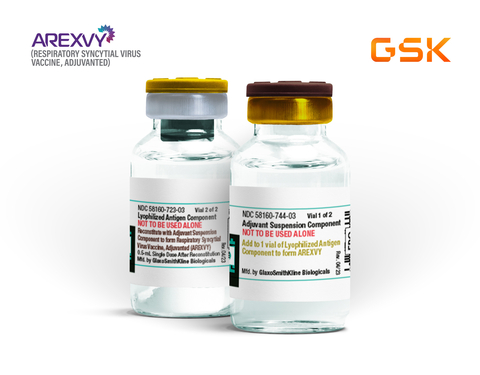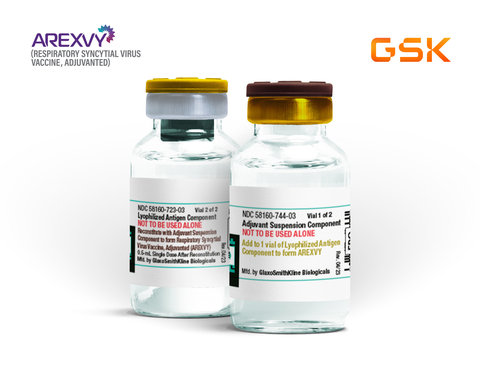PHILADELPHIA--(BUSINESS WIRE)--GSK plc (LSE/NYSE: GSK) today announced that the US Food and Drug Administration (FDA) has approved AREXVY (Respiratory Syncytial Virus (RSV) Vaccine, Adjuvanted) for the prevention of RSV lower respiratory tract disease (LRTD) in adults 50 through 59 years of age who are at increased risk. In the US, the vaccine is currently approved for use in adults aged 60 and older and recommended by CDC/ACIP using shared clinical decision-making.
A systematic review of studies in the US showed that RSV is estimated to cause 42,000 hospitalizations* each year in adults aged 50-64 years old.2 Adults with underlying medical conditions, such as chronic obstructive pulmonary disease (COPD), asthma, heart failure and diabetes3 are at increased risk for severe consequences from an RSV infection compared to those without these conditions. RSV can exacerbate these conditions and lead to pneumonia, hospitalization or death.4
Tony Wood, Chief Scientific Officer, GSK, said: “Today's approval reflects the importance of broadening the benefits of RSV immunization to adults aged 50-59 who are at increased risk. For those with underlying medical conditions, RSV can have serious consequences, so we are proud to be the first to help protect them from RSV-LRTD.”
The regulatory application was supported by positive results from a phase III trial [NCT05590403]5 evaluating the immune response and safety of GSK’s RSV vaccine in adults aged 50-59, including those at increased risk for RSV-LRTD due to certain underlying medical conditions.
Professor Ann R. Falsey, University of Rochester School of Medicine, said: “I am thrilled that GSK’s RSV vaccine is now approved for adults aged 50-59 at increased risk of RSV-LRTD. When it comes to the risks associated with RSV, age is just a number, an important number, but not the only factor to consider. Many adults in this age group have underlying health conditions that place them at increased risk for serious illness with RSV infection compared with those without these conditions. Now there is a vaccine approved that can help protect them.”
GSK has also filed regulatory submissions to extend the use of its RSV vaccine to adults aged 50-59 at increased risk in Europe, Japan and other geographies with regulatory decisions undergoing review. Trials evaluating the immunogenicity and safety of the vaccine in adults aged 18-49 at increased risk and immunocompromised adults aged 18 and over are expected to read out in H2 2024.
About AREXVY (Respiratory Syncytial Virus Vaccine, Adjuvanted)
Respiratory Syncytial Virus Vaccine, Adjuvanted, contains recombinant RSV glycoprotein F stabilized in the prefusion conformation (RSVPreF3). This antigen is combined with GSK’s proprietary AS01E adjuvant.
In May 2023, the FDA approved GSK’s RSV vaccine for the prevention of lower respiratory tract disease (LRTD) caused by respiratory syncytial virus (RSV) in individuals 60 years of age and older. The use of this vaccine should be in accordance with official recommendations. As with any vaccine, a protective immune response may not be elicited in all vaccines.
The vaccine has also been approved for the prevention of RSV-LRTD in individuals 60 years of age and older in over 40 countries, including Europe, Japan and US. Regulatory reviews in multiple countries are ongoing. The proposed trade name remains subject to regulatory approval in other markets.
The GSK proprietary AS01 adjuvant system contains STIMULON QS-21 adjuvant licensed from Antigenics Inc, a wholly owned subsidiary of Agenus Inc. STIMULON is a trademark of SaponiQx Inc., a subsidiary of Agenus.
Indication for AREXVY
AREXVY is a vaccine indicated for active immunization for the prevention of lower respiratory tract disease (LRTD) caused by respiratory syncytial virus (RSV) in:
- Individuals 60 years of age and older;
- Individuals 50 through 59 years of age who are at increased risk for LRTD caused by RSV.
Important Safety Information for AREXVY
- AREXVY is contraindicated in anyone with a history of a severe allergic reaction (eg, anaphylaxis) to any component of AREXVY
- Appropriate medical treatment must be immediately available to manage potential anaphylactic reactions following administration of AREXVY
- Syncope (fainting) may occur in association with administration of injectable vaccines, including AREXVY. Procedures should be in place to avoid injury from fainting
- Immunocompromised persons, including those receiving immunosuppressive therapy, may have a diminished immune response to AREXVY
- In adults 60 years of age and older, the most commonly reported adverse reactions (≥10%) were injection site pain (60.9%), fatigue (33.6%), myalgia (28.9%), headache (27.2%), and arthralgia (18.1%)
- In adults 50 through 59 years of age, the most commonly reported adverse reactions (≥10%) were injection site pain (75.8%), fatigue (39.8%), myalgia (35.6%), headache (31.7%), arthralgia (23.4%), erythema (13.2%), and swelling (10.4%)
- There are no data on the use of AREXVY in pregnant and breastfeeding individuals. AREXVY is not approved for use in persons <50 years of age
- Vaccination with AREXVY may not result in protection of all vaccine recipients
Please see full Prescribing Information.
About the NCT05590403 trial
NCT05590403 is a phase III, placebo-controlled, observer-blind, randomized, multi-country immunogenicity trial to evaluate the non-inferiority of the immune response and evaluate safety in participants aged 50 to 59, including those at increased risk for RSV-LRTD compared to older adults aged 60 years and above after a single dose of GSK’s RSV vaccine.
The study assessed the immune response in participants aged 50 to 59 with pre-defined stable chronic diseases leading to an increased risk for RSV disease (n=570). Immune responses in a broader group of participants aged 50-59 years without these pre-defined chronic diseases (n=570) were also evaluated compared to adults aged 60 and older. The trial’s primary endpoints were RSV-A and RSV-B neutralization titers of both groups at one month after the vaccine administration compared to adults aged 60 and older. There were also safety and immunogenicity secondary and tertiary endpoints. Safety and reactogenicity data were consistent with results from the initial AReSVi-006 data read out. The most common local adverse event was pain. The most common systematic adverse events were myalgia, fatigue and headache, which were largely transient and mild to moderate in intensity.
Results from this trial have been presented at the ACIP meeting of October 2023 and at ReSVinet in February 2024, and have been submitted for peer-reviewed publication. The data are being submitted to other regulators to support potential label expansions.
About RSV in adults
RSV is a common contagious virus affecting the lungs and breathing passages. Adults can be at increased risk for RSV disease due to comorbidities, immune compromised status or advanced age.4 RSV can exacerbate conditions, including COPD, asthma and chronic heart failure and can lead to severe outcomes, such as pneumonia, hospitalization and death.4 Each year, RSV is estimated to cause approximately 177,000 hospitalizations in adults 65 years and older6 and 42,000 in adults aged 50-64 years old in the US2.
About GSK
GSK is a global biopharma company with a purpose to unite science, technology, and talent to get ahead of disease together. Find out more at gsk.com.
Cautionary statement regarding forward-looking statements
GSK cautions investors that any forward-looking statements or projections made by GSK, including those made in this announcement, are subject to risks and
uncertainties that may cause actual results to differ materially from those projected. Such factors include, but are not limited to, those described under Item 3.D “Risk factors” in GSK’s Annual Report on Form 20-F for 2023, and GSK’s Q1 Results for 2024.
Registered in England & Wales:
No. 3888792
Registered Office:
980 Great West Road
Brentford, Middlesex
TW8 9GS
References
* adjusted for under-detection
1 Horn et al, “Disparities in Risk Factors for Severe Respiratory Syncytial Virus Disease among Adults in the United States”, Abstract presented at National Foundation for Infectious Diseases – 27 Annual Conference on Vaccinology Research – NFID 2024; May 8-10, 2024.
2 McLaughlin JM et al, “Rates of Medically Attended RSV Among US Adults: A Systematic Review and Meta-analysis” in Open Forum Infectious Diseases, Volume 9, Issue 7, July 2022.
3 Branche AR et al., “Incidence of Respiratory Syncytial Virus Infection Among Hospitalized Adults, 2017–2020” in Clinical Infectious Diseases, 2022:74:1004–1011
4 Centers for Disease Control and Prevention (CDC), RSV in Older Adults and Adults with Chronic Medical Conditions, 2024.
5 ClinicalTrials.gov, A Study on the Immune Response and Safety of a Vaccine Against Respiratory Syncytial Virus Given to Adults 50-59 Years of Age, Including Adults at Increased Risk of Respiratory Syncytial Virus Lower Respiratory Tract Disease, Compared to Older Adults 60 Years of Age and Above 2023. NCT05590403.
6 Falsey, AR et al. Respiratory Syncytial Virus Infection in Elderly And High-Risk Adults, in New Engl J Med 2005; 352:1749-59.





